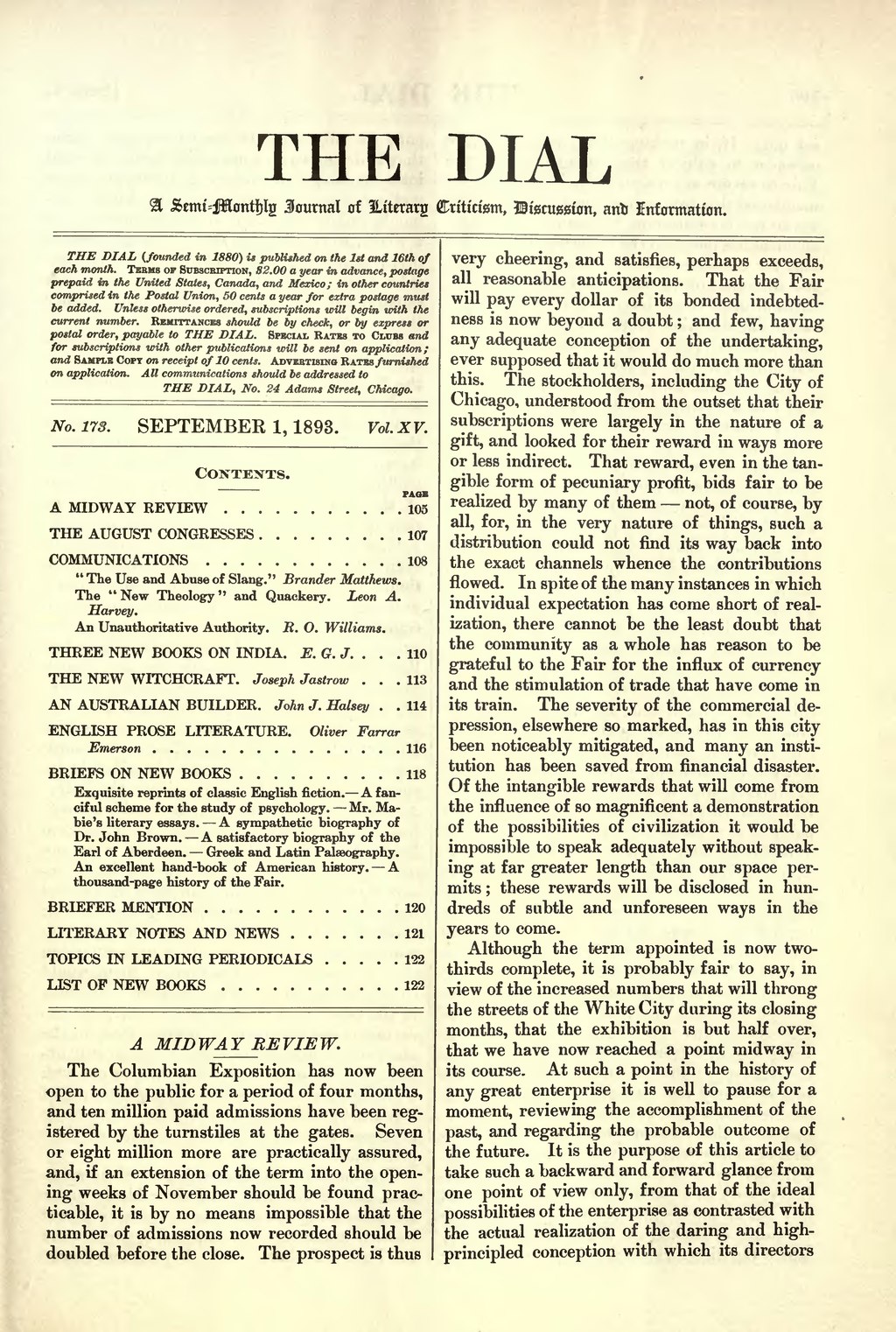THE DIAL (founded in 1880) is published on the 1st and 16th of each month. Terms of Subscription, 82.00 a year in advance, postage prepaid in the United States, Canada, and Mexico; in other countries comprised in the Postal Union, 50 cents a year for extra postage must be added. Unless otherwise ordered, subscriptions will begin with the current number. Remittances should be by check, or by express or postal order, payable to THE DIAL. Special Rates to Clubs and for subscriptions with other publications will be sent on application; and Sample Copy on receipt of 10 cents. Advertising Rates furnished on application. All communications should be addressed to
Contents.
A MIDWAY REVIEW 105
THE AUGUST CONGRESSES 107
COMMUNICATIONS 108
"The Use and Abuse of Slang." Brander Matthews.
The "New Theology" and Quackery. Leon A. Harvey.
An Unauthoritative Authority. R. O. Williams.
THREE NEW BOOKS ON INDIA. E. G. J. 110
THE NEW WITCHCRAFT. Joseph Jastrow 113
AN AUSTRALIAN BUILDER. John J. Halsey 114
ENGLISH PROSE LITERATURE. Oliver Farrar Emerson 116
BRIEFS ON NEW BOOKS 118
Exquisite reprints of classic English fiction.—A fanciful scheme for the study of psychology.—Mr. Mabie's literary essays.—A sympathetic biography of Dr. John Brown.—A satisfactory biography of the Earl of Aberdeen.—Greek and Latin Palæography.—An excellent hand-book of American history.—A thousand-page history of the Fair.
BRIEFER MENTION 120
LITERARY NOTES AND NEWS 121
TOPICS IN LEADING PERIODICALS 122
LIST OF NEW BOOKS 122
A MIDWAY REVIEW.
The Columbian Exposition has now been open to the public for a period of four months, and ten million paid admissions have been registered by the turnstiles at the gates. Seven or eight million more are practically assured, and, if an extension of the term into the opening weeks of November should be found practicable, it is by no means impossible that the number of admissions now recorded should be doubled before the close. The prospect is thus very cheering, and satisfies, perhaps exceeds, all reasonable anticipations. That the Fair will pay every dollar of its bonded indebtedness is now beyond a doubt; and few, having any adequate conception of the undertaking, ever supposed that it would do much more than this. The stockholders, including the City of Chicago, understood from the outset that their subscriptions were largely in the nature of a gift, and looked for their reward in ways more or less indirect. That reward, even in the tangible form of pecuniary profit, bids fair to be realized by many of them—not, of course, by all, for, in the very nature of things, such a distribution could not find its way back into the exact channels whence the contributions flowed. In spite of the many instances in which individual expectation has come short of realization, there cannot be the least doubt that the community as a whole has reason to be grateful to the Fair for the influx of currency and the stimulation of trade that have come in its train. The severity of the commercial depression, elsewhere so marked, has in this city been noticeably mitigated, and many an institution has been saved from financial disaster. Of the intangible rewards that will come from the influence of so magnificent a demonstration of the possibilities of civilization it would be impossible to speak adequately without speaking at far greater length than our space permits; these rewards will be disclosed in hundreds of subtle and unforeseen ways in the years to come.
Although the term appointed is now two-thirds complete, it is probably fair to say, in view of the increased numbers that will throng the streets of the White City during its closing months, that the exhibition is but half over, that we have now reached a point midway in its course. At such a point in the history of any great enterprise it is well to pause for a moment, reviewing the accomplishment of the past, and regarding the probable outcome of the future. It is the purpose of this article to take such a backward and forward glance from one point of view only, from that of the ideal possibilities of the enterprise as contrasted with the actual realization of the daring and high-principled conception with which its directors









